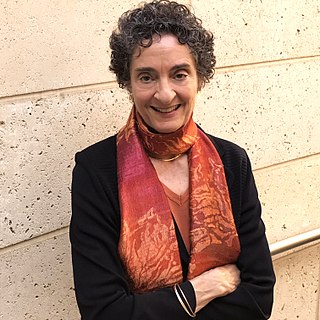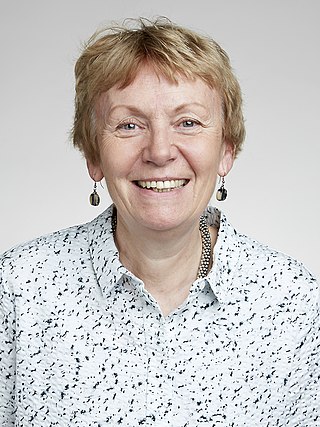Related Research Articles

Sir Colin Blakemore,, Hon was a British neurobiologist, specialising in vision and the development of the brain. He was Yeung Kin Man Professor of Neuroscience and senior fellow of the Hong Kong Institute for Advanced Study at City University of Hong Kong. He was a distinguished senior fellow in the Institute of Philosophy, School of Advanced Study, University of London and Emeritus Professor of Neuroscience at the University of Oxford and a past Chief Executive of the British Medical Research Council (MRC). He was best known to the public as a communicator of science but also as the target of a long-running animal rights campaign. According to The Observer, he was both "one of the most powerful scientists in the UK" and "a hate figure for the animal rights movement".

Carla J. Shatz is an American neurobiologist and an elected member of the American Academy of Arts and Sciences, the American Philosophical Society, the National Academy of Sciences, and the National Academy of Medicine.
UCL Neuroscience is a research domain that encompasses the breadth of neuroscience research activity across University College London's (UCL) School of Life and Medical Sciences. The domain was established in January 2008, to coordinate neuroscience activity across the many UCL departments and institutes in which neuroscience research takes place. In 2014, the Nobel Prize in Physiology or Medicine was awarded to the UCL neuroscientist John O'Keefe. In two consecutive years 2017 and 2018, the Brain Prize, the world's most valuable prize for brain research at €1m, was awarded to UCL neuroscientists Peter Dayan, Ray Dolan, John Hardy, and Bart De Strooper.
Trevor William RobbinsCBE FRS FMedSci is a professor of cognitive neuroscience and the former Head of the Department of Psychology at the University of Cambridge. Robbins interests are in the fields of cognitive neuroscience, behavioural neuroscience and psychopharmacology.
Richard Lewis Huganir is a Bloomberg Distinguished Professor in the Departments of Neuroscience and Psychological and Brain Sciences, Director of the Solomon H. Snyder Department of Neuroscience, and co-director of the Johns Hopkins Medicine Brain Science Institute at the Johns Hopkins University School of Medicine. He has joint appointments in the Department of Biological Chemistry and the Department of Pharmacology and Molecular Sciences in the Johns Hopkins School of Medicine.
Richard Winyu Tsien, is a Chinese-born American electrical engineer and neurobiologist. He is the Druckenmiller Professor of Neuroscience, Chair of the Department of Physiology and Neuroscience, and Director of the NYU Neuroscience Institute at New York University Medical Center, and also an emeritus faculty member of Stanford University School of Medicine.
Paul Richard Adams, FRS is a neuroscientist currently serving as a Professor in the Department of Neurobiology and Behavior at Stony Brook University in New York.

Feng Depei or Te-Pei Feng was a Chinese neuroscientist and physiologist. He is considered one of founders of modern Chinese neuroscience and physiology.
Timothy Vivian Pelham Bliss FRS is a British neuroscientist. He is an adjunct professor at the University of Toronto, and a group leader emeritus at the Francis Crick Institute, London.

Stuart Graham Cull-Candy is a British neuroscientist. He holds the Gaddum Chair of Pharmacology and a personal Chair in Neuroscience at University College London. He is also a member of the Faculty of 1000 and holds a Royal Society - Wolfson Research position.
Richard Graham Michael Morris,, is a British neuroscientist. He is known for developing the Morris water navigation task, for proposing the concept of synaptic tagging (along with Julietta U. Frey, and for his work on the function of the hippocampus.

Min Zhuo is a pain neuroscientist at the University of Toronto in Canada. He is the Michael Smith Chair in Neuroscience and Mental Health as well as the Canada Research Chair in Pain and Cognition and a Fellow of the Royal Society of Canada. Zhou was hosted in 2017-2018 as a Guest Professor at the Pharmacology Institute at Heidelberg University, Heidelberg.

John Graham Nicholls FRS is a British/Swiss physiologist.
Richard Alan North FRS is a British biomedical scientist, and Professor Emeritus at the University of Manchester. North grew up in Halifax, West Yorkshire and attended Heath Grammar School, before studying at University of Aberdeen. He graduated in medicine and in physiology (BSc). He took a PhD in the group of Hans Walter Kosterlitz, and worked in Aberdeen hospitals as house office and registrar.

Maria Fitzgerald is a professor in the Department of Neuroscience at University College London.

David Lodge is a research fellow in the Department of Physiology and Pharmacology at the University of Bristol.
Tara Keck is an American-British neuroscientist and Professor of Neuroscience and Wellcome Trust Senior Research Fellow, at University College London working in the Department of Neuroscience, Physiology, and Pharmacology. She is the Vice-Dean International for the Faculty of Life Sciences. She studies experience-dependent synaptic plasticity, its effect on behaviour and how it changes during ageing and age-related diseases. She has worked in collaboration with the United Nations Population Fund on approaches for healthy ageing. Her recent work has focused on loneliness in older people, with a focus on gender. She was named a UNFPA Generations and Gender Fellow in 2022.
Graeme Henderson is a British neuroscientist whose research focuses on opioid addiction. He is professor of pharmacology in the School of Physiology, Pharmacology and Neuroscience, University of Bristol.
HollisT. Cline is an American neuroscientist and the Director of the Dorris Neuroscience Center at the Scripps Research Institute in California. Her research focuses on the impact of sensory experience on brain development and plasticity.
Marina Elizabeth Wolf is an American neuroscientist and Professor of Behavioral Neuroscience at Oregon Health & Science University. Previously she served as Professor and Chair of the Department of Neuroscience in the Chicago Medical School at Rosalind Franklin University of Medicine and Science. She has been a pioneer in studying the role of neuronal plasticity in drug addiction. Her laboratory is particularly interested in understanding why individuals recovering from substance use disorder remain vulnerable to drug craving and relapse even after long periods of abstinence.
References
- ↑ "Prof Graham Collingridge Authorised Biography – Debrett's People of Today, Prof Graham Collingridge Profile". Debretts.com. Archived from the original on 15 June 2013. Retrieved 21 December 2012.
- ↑ "Professor Graham Collingridge – Physiology and Pharmacology". University of Bristol. 5 September 2011. Archived from the original on 28 July 2012. Retrieved 21 December 2012.
- ↑ "Bristol Neuroscience Directory". University of Bristol. 13 January 2011. Retrieved 21 December 2012.
- ↑ "Scientific Advisory Board". Dollar Store View. Retrieved 10 April 2019.
- ↑ "No. 62666". The London Gazette (Supplement). 8 June 2019. p. B8.